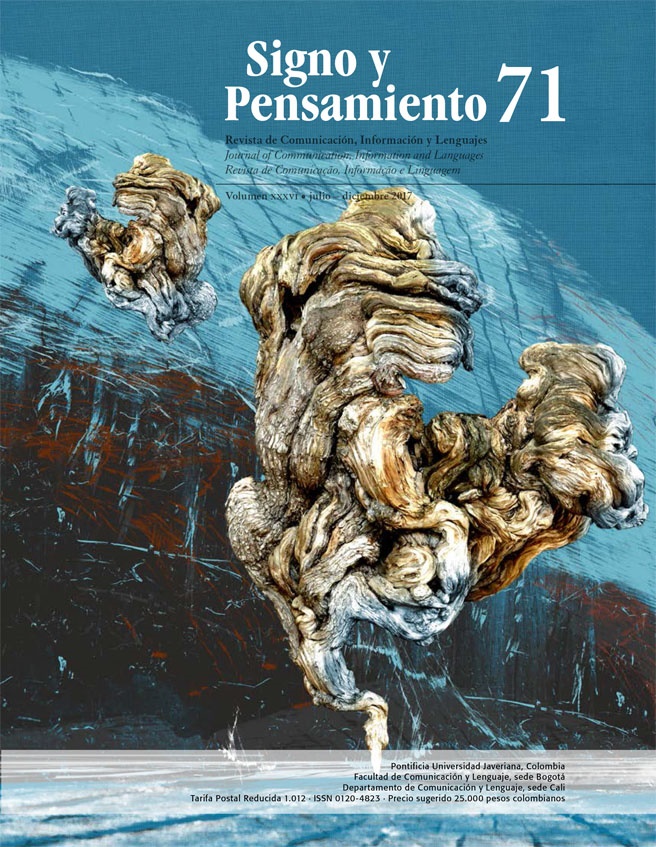Abstract
The research is framed in the studies related to academic literacy and the writing processes within disciplines. The main objective was to identify from what concepts of writing the curriculum of the LLM provides its students with strategies for writing.
To establish the theoretical foundations, we carried out a historical sweep of the studies on writing in linguistics and we reviewed the contributions concerning the concept of academic writing. Results show that there is a “polysemy” of the term academic writing, which suggests a wide diversity of methodological approaches in the classrooms.
During the research process, there was also a discussion about the differences between writing in the L1 and the L2, and the relevance of creating dialogues between different program areas to establish clear criteria for evaluation and providing feedback of texts. Finally, we conclude that it is necessary to discuss disciplinary issues in language studies because academic writing processes will be hampered without a defined and shared field of study.
Carlino, P. (marzo de 2006). La escritura en la investigación (Documento de trabajo No. 19). Buenos Aires: Universidad de San Andrés.
Carlino, P . (2007). Escribir, leer y aprender en la universidad. Una introducción a la alfabetización académica. México: Fondo de Cultura Económica.
Cassany, D. (1999). Construir la escritura. Barcelona: Paidós.
Hernández, G. (2012). Teorías implícitas de escritura en estudiantes pertenecientes a dos comunidades académicas distintas. Perfiles educativos, 34(136), 42-62. Recuperado de: http://www. redalyc.org/articulo.oa?id=13223068004
Hyland, K. (2007). Genre and second language writing. Míchigan: University of Michigan Press.
Hyland, K. (2009). Teaching and researching writing. Londres: Pearson Longman.
International Network of WAC Programs (2014). Statement of WAC Principles and Practices. Recuperado de http://wac.colostate.edu/ principles/statement.pdf
Ministerio de Educación Nacional (2014). Lineamientos de calidad para las licenciaturas en educación (Programas de formación inicial de maestros). Recuperado de http://www. mineducacion.gov.co/1621/articles-344483_ archivo_pdf.pdf
Muñoz, I. y Musci, M. (Junio de 2015). Escritura de géneros profesionales en la carrera de Ingeniería en Recursos Naturales Renovables de la UNPA: el Plan de Manejo de Fauna. Trabajo presentado en el Congreso Nacional “La lectura y la escritura en las sociedades del siglo XXI” de la Cátedra UNESCO, Rosario, Argentina.
McLeod, S. (2012). The Pedagogy of Writing Across the Curriculum. En T. Myers y P. Rogers (Eds.), Writing across curriculum: A critical sourcebook (pp. 54-67). New York: Bedford.
Russell, D. (2002). Writing in the academic disciplines: a curricular history. Southern Illinois University Press.
Silva, T. y Kei Matsuda, P. (2002). Writing. En N. Schmitt, An Introduction to Applied Linguistics (pp. 251-266). Londres: Routledge.
Tapia, M., Bustos, C., Salazar, T., Muñoz, C., Varela, M., y Sáez, C. (2014). Reacciones de los estudiantes a los comentarios escritos que proveen docentes de lenguaje en enseñanza secundaria chilena. Revista Enunciación, 19 (1), 39-52. Recuperado de http://revistas. udistrital.edu.co/ojs/index.php/enunc/article/ view/5685
Tolchinsky, L. (1993). Aprendizaje del lenguaje escrito: procesos evolutivos e implicaciones didácticas. Barcelona: Anthropos.
Vergara, O. (2015). Représentations de l’écriture académique dans une licence en langues étrangères. Revista Lenguaje, 43(2), 359-386. Recuperado de http://www.scielo.org.co/pdf/ leng/v43n2/v43n2a07.pdf

This work is licensed under a Creative Commons Attribution 4.0 International License.
Copyright (c) 2018 Stephania Ballén Vargas, Andrés Felipe Herrera Gonzáñez



